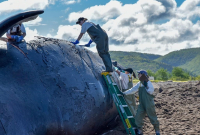Support strong Canadian climate journalism for 2025
Confirmation this week that a sixth North Atlantic right whale has died in Canadian waters is devastating for the endangered species because recent growth in the population has been virtually wiped out, a leading whale expert said Friday.
Marine ecologist Mark Baumgartner, who works at the Woods Hole Oceanographic Institution in Massachusetts, said seven right whale calves were born earlier this year off the southeast coast of the United States.
"The more animals that die, the more pressure that is ratcheted up on all sides of this," said Baumgartner, who is also chairman of the North Atlantic Right Whale Consortium.
"And we know that we don't actually find all of the dead animals. We may have already wiped out the gains."
There are about 400 North Atlantic right whales left on the planet, which is why the latest deaths have prompted some experts to start using words like "panic" and "extinction."
Last year, there were no recorded deaths of right whales in Canadian waters, which was an immense relief for conservationists, given the fact that 12 right whales had died in 2017 — mostly from ship strikes and entanglements in fishing gear.
However, there were no known right whale births last year.
Aside from the renewed spike in the species' mortality rate, Baumgartner said Canadian officials are having a tough time keeping track of the whales because they appear to be spread out across the Gulf of St. Lawrence.
The federal Fisheries Department says a surveillance flight spotted the sixth dead whale Thursday drifting off Quebec's Gaspe Peninsula.
Other dead whales have been found near Quebec's Anticosti Island and east of Iles-de-la-Madeleine, locations that are more than 250 kilometres apart.
"That's completely consistent with what right whales do," Baumgartner said in an interview from Boston. "They move around a lot ... It puts a lot of more emphasis on the monitoring ... My guess is, that part has failed this year. It worked last year, and it failed this year."
He said the Canadian government could be doing a better job protecting the whales from ship strikes and entanglements — the leading causes of death for the lumbering giants.
As an example, he pointed to a 40-year-old female whale named Punctuation, whose carcass was spotted off Iles-de-la-Madeleine last week.
The injuries that killed her were consistent with a vessel strike, but Baumgartner said Transport Canada has yet to restrict shipping lanes in that area.
"There's still a disconnect between what the data are telling us, and what protections are in place," he said.
Baumgartner said Ottawa is not using all of the data that is being collected by marine mammal researchers, including underwater recordings used to track the whales' movements.
"There's more information that the Canadian government could be using, but they aren't," he said.
Transportation Canada spokesman Simon Rivet issued an emailed statement saying the department was "working tirelessly to protect both this endangered species and vessel crews who" travel through the Gulf of St. Lawrence.
Rivet noted that on June 26 the department imposed speed restrictions on larger vessels in two designated shipping lanes north and south of Anticosti Island.
"Transport Canada continues to gather and analyze data to establish what changes, if any, should be made," he said.
Sean Brillant, a senior conservation biologist with the Canadian Wildlife Service, said the federal government has to be more agile in responding to the rapidly increasing number of deaths.
He said Fisheries and Oceans Canada has done a good by expanding the area closed to commercial fishing, but he also said Transport Canada must do more.
"If necessary, they need to be severe in their restrictions if they want to save these animals," he said in an interview Friday. "They've got to step up and put their foot down ... We need to see some tough measures in place."
Brillant said only one of the whales that has died this season was found within the department's management area.
As well, he said Ottawa must invest more in supporting the marine mammal teams that are conducting tests on the whale carcasses.
Most of those teams include federal personnel as well as academic researchers and volunteers from non-governmental organizations.
"These people are running all over the Maritimes," Brillant said, adding that he's worried about burnout.



Comments